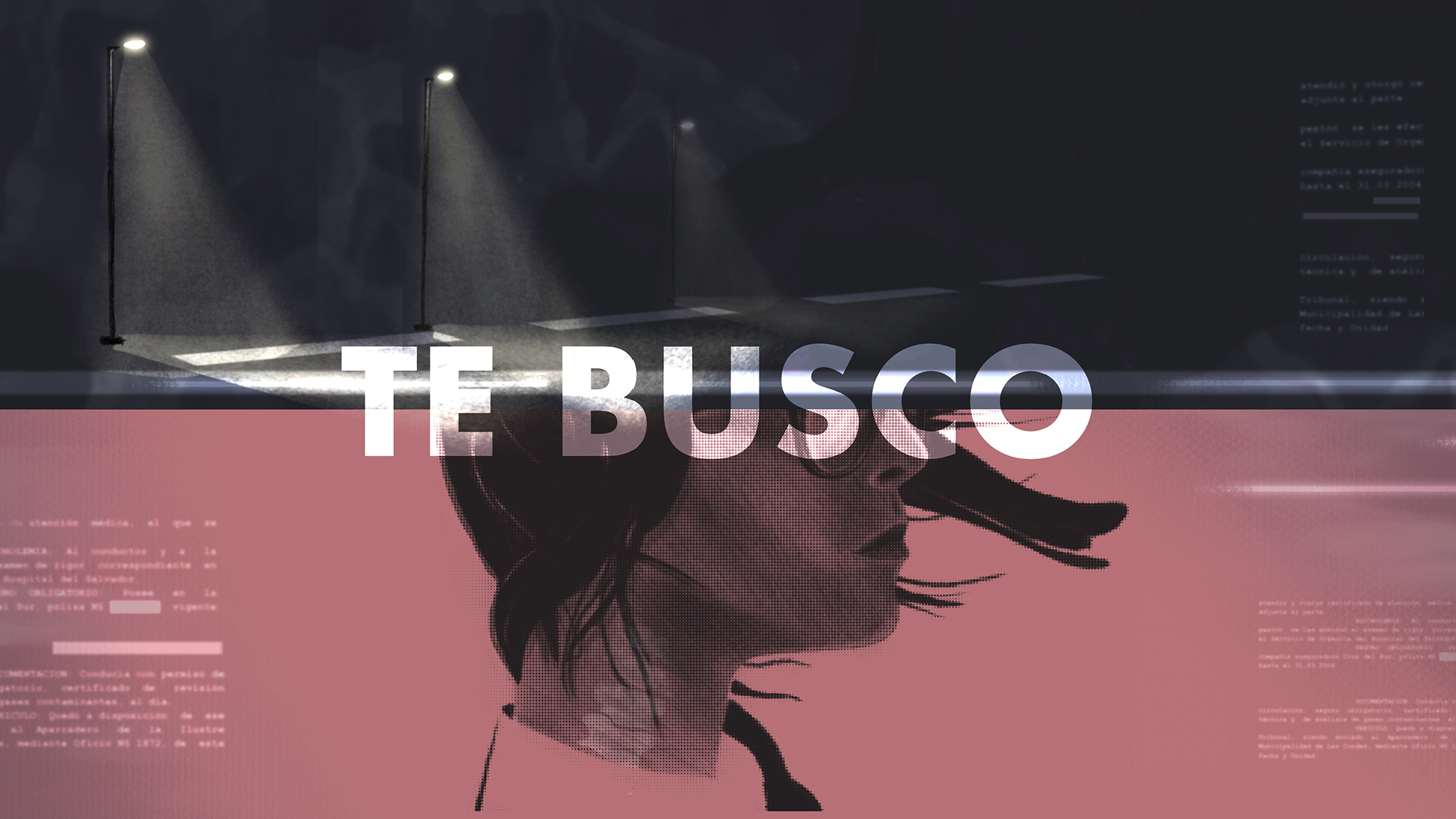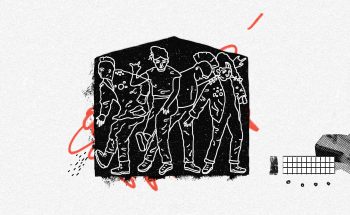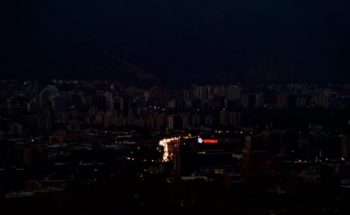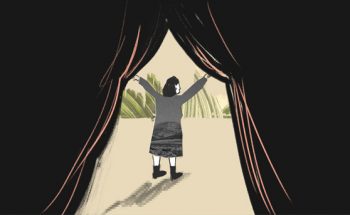
TE BUSCO: The Accident [Special Episode] | Translation
Share:
► Click here to return to the episode official page, or here to see all the episodes.
► Join Deambulantes. Our membership program help us continue covering Latin America.
►Do you listen Radio Ambulante to improve your Spanish? We have something extra for you: try our app, designed for Spanish learners who want to study with our episodes.
[Daniel Alarcón]: This is Radio Ambulante from NPR. I’m Daniel Alarcón.
A few months ago, everyone on the Radio Ambulante team got hooked on the story of a search. A Chilean journalist nearly died in a hit-and-run, and 20 years later, she tries to find the person behind the wheel.
A search that, in the process, explores the way we relate to our traumas, our bodies, and the past.
The entire story is told in an 8-episode podcast called Te busco. It’s a co-production between Podium Podcast and our talented friends Catalina May and Martín Cruz, perhaps better known as the creators of the podcast Las Raras.
We know you’ll like it as much as we do. So today, we want to share with you the first episode, so you’ll be encouraged to listen to the rest. You can find the others by searching for Las Raras or Te Busco on your favorite podcast app.
This episode is titled: The Accident.
Here’s the story.
[Las Raras]: Las Raras and Podium Podcast present: Te busco.
[Quince]: And I ran, ran, ran. I pass through here. I ran, ran, ran. You were lying here, like this, your head here, blood.
[Catalina May]: Nooooo.
[Archive Soundbite]
[Mega]: Through a newspaper ad, and now also on television, a woman is looking for the man who ran her over 20 years ago in the Las Condes commune.
[Nico]: No, no, no, the car was more here.
[Pelao]: 50, 60 meters from where it hit you to where you lay.
[Archive Soundbite]
[TVN]: In other news, a woman has started a search to find, listen to this, a driver who ran her over 20 years ago. She placed an ad in the newspaper and has even put up posters to try to locate him.
[Quince]: I remember I started talking to you: “Cata, don’t leave, hold on, Cata, hold on, Cata, and you were…”
[Cata]: Gone. But was I unconscious?
[Nico]: Yes, unconscious.
[Quince]: You were dead.
[Cata]: When I was 23, I almost died in a hit-and-run. I ended up with amnesia, half of my body broken, and a trauma I never talk about. As a journalist, I dedicate myself to telling stories. But for 20 years, I’ve been avoiding telling mine.
[Archive Soundbite]
[CHV]: Through an ad in a newspaper, Catalina May is looking for the man who ran her over 20 years ago in the Las Condes commune. An accident in which she almost lost her life.
[Cata]: To reconstruct everything that really happened, I need a key piece: finding the man who ran me over. I need us to sit face to face, and he needs to tell me the moment when he could have killed me. Because I don’t remember anything.
[Archive Soundbite]
[CHV]: It was October 30, 2003, 11 at night. Catalina was on her way home. This time the journey was a bit longer. A hit-and-run would mark her life.
[Cata]: I have no clues to reach him. And if I really want to find him, I’ll have to step out of my safe space. I’ll even have to expose myself in the media and go viral.
[Archive Soundbite]
[TVN]: A search that doesn’t stop. With ads, posters, social media. Everything is useful to achieve a goal that, for her, is to definitively close a chapter of her life.
[Cata]: My great companion in this search has been Martín Cruz, the sound director of Las Raras.
Together, we have worked for months to reconstruct what happened to me and to try to find the man who ran me over.
I am Catalina May.
This is Las Raras, stories of freedom.
Episode 1: The Accident
[Cata]: To begin investigating what really happened on the night of my hit-and-run, I talk to the three friends who were with me at that moment: Nico, Quince, and Pelao.
It was Thursday, October 30, 2003, around 11:00 at night. The four of us were in a car going up Cristóbal Colón, an avenue that crosses the Las Condes commune in Santiago de Chile. Quince was driving.
[Quince]: At that time, I had a gray, two-door Volkswagen Golf GTI.
[Cata]: Colón Avenue runs from east to west and has four lanes, two in each direction. At that time, there was still traffic. I was in the back seat with Nico. Pelao was the co-pilot.
[Pelao]: Well, Quince drove, right, because he had drunk the least. Those trips were talking about fish heads, listening to music, windows down, taking in some air.
[Cata]: We were on our way to my apartment after spending the afternoon together. We had been listening to music, drinking beer, and smoking marijuana. My friends were going to a party, but I was depressed and had gotten drunk. Nico says that’s why they were taking me home.
[Nico]: Sure, since you were planning to take the bus or a taxi, something could have happened to you. That’s why we were taking you home.
[Cata]: When we reached the corner of the street where I lived, called Domingo Bondi, Quince realized he couldn’t turn to drop me off at the door of my building.
[Quince]: Because Domingo Bondi, the street, goes south, and we were going in the opposite direction. So I couldn’t turn from Colón to Bondi. So I said, “No, Cata, don’t worry, I’ll go around, I’ll go around.”
[Cata]: But we happened to hit a red light and stopped at the corner. Pelao, who was the co-pilot, pushed his seat forward and let me get off on the sidewalk side.
[Pelao]: Then I got off. You got off on this side. We closed the door. The light turned green.
[Cata]: I just had to cross Colón Avenue and walk a few meters to reach my building. My friends turned onto Domingo Bondi on the other side.
[Nico]: We moved slowly because we were waiting for you, for you to advance a bit more towards your home, I don’t know. And at some point, I didn’t see you. “Hey, guys, I don’t see Cata. No, I don’t see Cata, I don’t see Cata.”
[Quince]: And I hear a crash.
[Pelao]: Very loud, very loud. The impact was tremendous. Tremendous impact.
[Quince]: So we parked the car and got out.
[Pelao]: Quince got out. Nico got out. I stayed paralyzed inside the car. No, I couldn’t react.
[Quince]: All dark, gloomy, no one around. And I start looking, looking. But quickly, I see a lump and a lump on Colón towards there, I don’t know, 50 meters, far, far, super far. And it was quick; I said, “Damn, it’s Cata.”
[Nico]: And we went to see, and it was you. The one lying on the ground.
[Quince]: For me, that lump was like a black shroud, a discarded lump. I thought you were dead; it’s impossible that you were alive.
[Cata]: They tell me that while I was lying on the street, people started to arrive. Some cars stopped, and even a bus.
[Quince]: Obviously, many people heard the crash, looked out the window, noticed this, and started coming down.
[Nico]: A lot of people arrived instantly. A lot, a lot, a lot, a lot, a lot, a lot of people, quickly. In fact, a doctor or a girl arrived. “I am a doctor, a nurse.” Something like that. She came to take your initial vital signs, you know.
[Quince]: So I said, “Okay, Cata is alive.” We covered you because it was cold.
[Pelao]: I stayed in the car for a while, then I approached the corner little by little, and then I crossed. I kind of collapsed; I didn’t know what to do.
[Quince]: We moved you a bit, precisely because of the bruises and everything. The typical, couldn’t move much, but we moved you a bit because you were too twisted.
[Nico]: I don’t know, that’s when I started feeling fear. Fear, fear, fear… I couldn’t grasp what was happening.
[Pelao]: And we waited those minutes that are horrible, right?
[Quince]: I stayed with you, talked to your ear. I said, “Cata. Cata, fight. Fight, Cata.” Yes, I kept talking to you all the time. But no, you were absolutely unconscious.
[Nico]: Unconscious, unconscious. You just groaned: “Ahh, ahh,” nothing more, but a very faint groan.
[Quince]: I mean, I thought, it’s at the very least an accident where you see a person, and they become a vegetable.
[Cata]: A short time later, a police car and two ambulances arrived. They lifted me into one, and following protocol, they transferred me to the Emergency Room of the Salvador Hospital, seven kilometers away. Nico went with me.
[Nico]: I got in the ambulance in the front. Oh, terrible. Because I could hear you groaning. Ahh, you were groaning, man. Nothing more, nothing more. You couldn’t string together a word or anything.
[Cata]: Amidst all this chaos, none of my friends cared about the person who ran me over.
[Pelao]: We also didn’t talk to the person.
[Nico]: No, neither did we, no, no, no.
[Quince]: Nothing, nothing, nothing. I focused on you until they lifted you into the ambulance.
[Nico]: “I didn’t see them.” The only thing she kept saying. “I didn’t see them. She suddenly appeared. No, no, no, man, I didn’t see them. I didn’t see them.”
[Quince]: The person was remorseful, but I don’t have any details. It was a man, around 30 years old, somewhat dark-skinned.
[Pelao]: No. I don’t remember what he looked like.
[Cata]: At that moment, my friends also didn’t accurately register what type of car hit me.
[Nico]: It wasn’t a sedan. It wasn’t a sedan car, you know. But a car larger than a sedan.
[Pelao]: It was a car, a sedan, and if I’m not mistaken, it was a green car.
[Quince]: A van. It was like one of those Citroen Fiorino, like a delivery van, white. Two doors in front and closed in the back.
[Cata]: While I was in the ambulance with Nico, Quince and Pelao’s main concern was to inform my parents. They lived in Chillán, 400 kilometers south of Santiago.
I had never heard this story before.
The first thing they tried to do was inform my sister, but they couldn’t find her because it was the year 2003, and she didn’t have a cellphone. So they contacted Claudia, a friend of my sister’s, and asked her to notify my parents.
[Claudia]: I almost died. I swear, I almost died. But eventually, I had to do it.
[Cata]: She knew how difficult it was going to be for my parents to receive this news. We have always been very close, and they have supported me in all my decisions. The only thing they have asked in return is for me to take care of myself.
[Mom]: I was in Chillán. We were sleeping. And my phone rings.
[Claudia]: And your mom answers quite normally. Obviously, she was sleeping. And she says, like, “Hi, Claudia, how are you?”
[Mom]: And Claudia tells me right away, “Aunt, did you hear about Cata’s accident?”
[Claudia]: And your mom, well, her reaction was like… Ugh! It was… very intense because I felt, heard, that she sort of swallowed her breath. That’s what I felt, like a very strange sound, as if she stopped breathing.
[Mom]: And I say to her, “No. What happened? How is she?”
[Claudia]: And she kept insisting that I tell her the truth, asking whether you were dead.
[Cata]: At that moment, my parents were particularly vulnerable to news like this. They had lost three very dear family members in the last few months in two different traffic accidents.
[Dad]: Of course. Mom receives that call, and… And then we try to react because the blow is so strong, so fierce. And it’s so devastating, especially when you are far away, which makes it doubly difficult. “Oh, well. How awful. Well, what do we do? What do we do? Well, let’s take the car and go to Santiago.” I think we left in 15 minutes.
And, well, a horrible trip. Horrible. Eternal. Full of uncertainties, a journey in which I lived the most horrible thing a parent can experience, which is to imagine that your daughter has died. Because throughout the trip, I kept imagining that you had died and that they weren’t telling me, that they were waiting for me to get there. So, in a way, I lived your death. I lived it.
[Cata]: To try to understand better what happened, I asked my friends to meet at the intersection where the accident occurred. I have passed by there many times, but never before did I bother to know the details. It’s around 11:00 at night, and it’s cold. Martín directs the action.
[Martín]: The idea for today is as follows: let’s do a bit of a scene reconstruction, yes. Quince, you show us where you remember Cata lying, so we can measure the distance between that place and the traffic light, to see how far Cata crossed the street…
[Cata]: We start inside the car, each one sitting as we were that night.
[Cata]: Quince, why do they call you Quince?
[Quince]: Because of my bad behavior.
[Cata]: Why? Are you like a fifteen-year-old?
[Quince]: Yes.
[Cata]: Let’s go slow, let’s go slow. Were we the first car to stop at the traffic light when we arrived?
[Quince]: Yes, there was no one, forget about the cars.
[Cata]: But was it lit up like it is now?
[Quince]: No, it was dark.
[Cata]: We got off at the same corner where I got off that night. We know that from there, I managed to cross three out of the four lanes on Colón Avenue. And when I was about to reach the other side, a car ran over me, hitting my entire right side.
[Quince]: I remember the impact very strongly, but not the braking.
[Nico]: I don’t remember the braking either.
[Pelao]: No, I don’t think he even had time to brake because Cata got off there, lowered her head, and started running.
[Quince]: And look where you were. Over there by the post with that gray thing.
[Cata]: Quince shows me the place where he remembers I was lying after the accident. It’s far from the corner. We run diagonally across the four lanes to get there.
[Quince]: And I ran, ran, ran…
[Cata]: We ran diagonally across the four lanes to get there.
[Quince]: I passed here, and you were like this. Your head here. Blood.
[Cata]: Nooo.
To establish the facts, we measure the distances.
[Nico]: No, no, no. The car was more to this side.
We think this data could help us calculate the speed at which the driver who hit me was coming.
[Cata]: Alright, let’s mark.
[Quince]: You were right here.
[Cata]: Alright.
[Quince]: 1, 2…
[Cata]: First, we measure from where my friends say I was lying to where they remember the car ended up.
[Cata]: Was the car here or not?
[Quince]: The car was around here.
[Cata]: And how many steps did you take?
[Quince]: 25.
[Cata]: Alright. 1, 2, 3, 4, 5…
Then we measure the distance from there to the traffic light.
[Pelao]: … 28, 29, 30.
[Quince]: It’s about 60 meters…
[Pelao]: Yes, 50 to 60 meters from where you were hit to where you ended up.
[Quince]: But that’s the distance that under any circumstance someone would say, she should be dead.
[Cata]: My friends can’t agree on the type of car that hit me. But they do remember that it ended up with a dented hood and a broken windshield.
Hey, but I did cross the entire street; it’s not like I threw myself at the car.
[Quince]: You were almost done crossing.
[Cata]: I crossed from there to here, so the guy like snuck up on me out of nowhere, right?
[Pelao]: But imagine, a fast car comes, and suddenly the guy has a green light, and you do this (runs).
[Cata]: What I’m saying is that if it had been a very attentive driver, he might have seen me because I still crossed several meters, and maybe he would have managed to brake. Or if he had come less quickly, he wouldn’t have hit me, and I would have had the chance to cross. I don’t know; I’m just putting forward hypotheses, you know.
To check how likely it is that the driver didn’t see me, we timed how long it took me to cross the avenue running.
[Cata]: Okay, when it turns green, I’m going to run. Nico, you have to be ready. How long did it take?
[Nico]: Less than five seconds.
[Cata]: Wow, nothing, nothing, nothing.
My friends speculate about how things happened, because the truth is they didn’t see what happened. We don’t have any direct witnesses to the moment of the accident.
[Pelao]: Here, you could always go faster than the rest because this was pretty clear downhill, so a guy who sees the green light from two blocks away comes fast.
[Nico]: At least at eighty.
[Pelao]: Yes.
[Quince]: A car at eighty, catches you there, takes you at least to the next tree, to the one by that white door, and there you flew.
[Nico]: According to me, he didn’t make her fly; according to me, he took her on top, and when he braked, Cata was ejected.
[Pelao]: I think because you ran down and since you’re lighter, it grabs you with your leg in the air and can lift you… because if you had suffered all the impact, it would’ve broken you…
[Cata]: Yes, I did break, Pelao…
[Pelao]: It would break you worse… Then you flew out of the car…
[Cata]: It didn’t crush me, let’s say.
[Pelao]: It didn’t crush you. If it had crushed you…
[Cata]: No, that would have been worse.
[Cata]: It’s like they’re telling me someone else’s story; it’s challenging for me to embody it, you know.
[Quince]: It’s hard for me too to understand that I was there that day; it’s part of the process, you know.
[Cata]: It’s like I still find it hard to accept that it’s my story; it’s like someone is telling me a movie. It’s not my own experience, but it still feels weird.
One of my hopes in doing this scene reconstruction is that my friends remember something that helps me reach the driver who hit me.
[Pelao]: You don’t remember anything about him, right?
[Cata]: I would like to look for him, but I don’t have any information. Don’t you remember anything about him?
[Pelao]: No, I panicked.
[Cata]: You didn’t see him?
[Quince]: I don’t remember his face or anything; I didn’t have time to see him.
[Cata]: Wait a moment. If neither of you remembers the guy, how do we know he stopped and was there? Who saw him?
[Nico]: Well, we saw him.
[Cata]: But who saw him, did you see him? Because these two guys are telling me they didn’t see him.
[Nico]: He was standing here.
[Cata]: But was he… do you have the image of having seen him?
[Nico]: Yes, yes. He was standing.
[Quince]: Did you see him under the car?
[Nico]: Yes, under the car, the guy holding his head.
[Pelao]: I remember that; I remember seeing the guy…
[Cata]: Hands on his head.
[Pelao]: Yes, looking distressed.
[Cata]: But that image does exist.
[Nico]: Yes, yes, yes. What was the guy like, young, old, skinny, dark, blonde, I have no idea.
[Cata]: All this exercise with my friends provides me with new details about my accident that surprise me. For the first time, I try to imagine myself lying on the pavement, or try to feel the force of the impact. But it’s difficult. I have no memory.
After all this, we don’t get any new information that leads us to the driver who hit me. With Martín, we decided that if we want to take this search to the end, we’ll need the help of professionals. That’s why we contacted a team of investigators experienced in finding people.
[Investigator]: Okay, Cata, let’s start investigating and make inquiries. But keep in mind that there’s always the possibility that what we find may not be pleasant for you.





